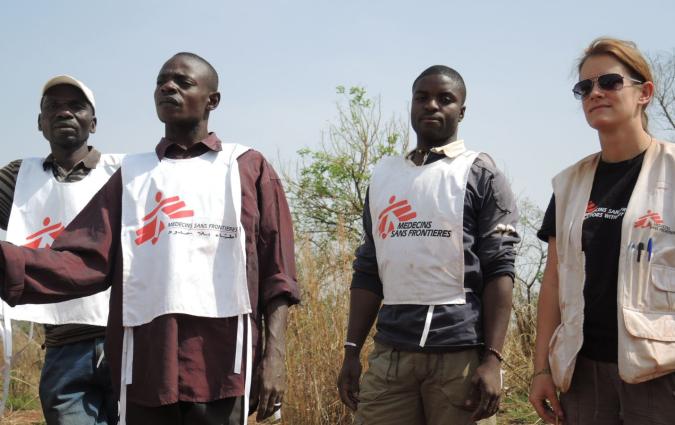Mar Cabra from The Self-Investigation on how media leaders can protect their teams (and themselves) from burnout

Mar Cabra, co-founder of The Self-Investigation.
Media and journalism can be a high-stress industry to work in. But the extent of the problem and its long-term consequences on journalists are not always fully acknowledged.
Mar Cabra found out the hard way.
She worked as Data Editor at the International Consortium of Investigative Journalists (ICIJ). Shortly after she won a Pulitzer Prize with her team for their reporting on the Panama Papers, she experienced burnout, forcing her to quit journalism altogether. As she recovered, she co-founded The Self-Investigation, an organisation whose goal is to promote a healthier way of working in newsrooms around the world.
I spoke with Cabra about her own experience and about the steps managers can take to prevent and address burnout in their teams.
Q. Can you start by telling us about your own experience with burnout following your reporting on the Panama Papers investigations, and your path towards founding the Self-Investigation?
A. When we won the Pulitzer Prize in 2017, I was at the height of my professional career. Yet I felt miserable. I was exhausted physically and emotionally. I realised I no longer liked my job, and I was in a very negative mood all the time.
Back then, I didn't know what was happening to me – I just knew that I needed to quit my job to save myself. Eventually, I saw a specialist who told me that what had happened to me had a name: burnout.
Burnout is a work-related condition caused by excessive and accumulated stress over too long a period. It took me quite a long time to recover from my burnout. But at some point, I realised that I could turn this difficult experience into a learning lesson for myself and others – which is when I co-founded The Self-Investigation.
Q. We know that tight deadlines and intense pressure tend to lead to high stress, but these are often an unavoidable part of journalistic work, especially for those of us who work in breaking news. Can you share one key practical tip for journalists seeking to protect their mental health during these intense periods?
A. I will use a sports analogy here. Journalists are like runners. Sometimes we are sprint runners, like when breaking news hits. And sometimes we are marathon runners, like when we are working on deep-dive investigative stories. But in both cases runners rest after a big challenge.
Let's learn from athletes and intentionally incorporate rest whenever a big sprint or marathon is over. It’s also important to incorporate rest in small doses every day throughout the workday. This means taking regular breaks – especially breaks from the screen. Journalists should make time to do things that calm down their nervous system, like going for short walks.
Q. We know that managers often play a crucial role in shaping the dynamics of their teams. How can they foster a team culture that encourages journalists to prioritise their mental health, without compromising their work?
A. As a former data journalist, let me give you some stats: studies have shown that managers have as much of an impact on people's mental health as their spouses. So as a manager, it’s important to acknowledge that you do have a big responsibility. And part of your responsibility as a leader is to recognise the signs when your team members are not doing well.
Take the time to notice if someone’s usual behaviour is shifting in some way – whether they are withdrawing from work, acting up in meetings, or losing motivation. It’s also important to remember that burnout is typically misidentified as underperformance. Look out for these signs by checking in regularly. I truly believe that one of the key skills a manager needs to have is basic mental health literacy.
Q. What responsibility do news organisations have in addressing and mitigating burnout among their employees?
A. A crucial thing to remember is that burnout is not an individual capacity issue. A lot of people think, “Oh, this person just couldn't cope” or “What's wrong with me? Why did I burn out and not my other colleagues?”
The reality is that all organisations have a duty of care towards their employees – and not doing anything until it is too late is not duty of care. There are preventative steps that can and should happen at an organisational level, including providing staff with adequate mental health training, as well as access to mental health resources. The responsibility shouldn’t rest only on the manager.
Q. You’ve often talked about how newsroom managers must also protect their own mental health. What tips do you have for managers seeking to draw boundaries for themselves while also looking out for their team?
A. There is definitely a tendency for some newsroom leaders to protect their teams but forget to protect themselves. It’s no coincidence that managers – and especially middle managers – are among the first ones to burn out, because there is often a “sandwich effect,” where they are being squeezed for time and energy by the top leaders and squeezed by their team as well.
If you are a manager, remember: you are as important as the team. You also need rest. You also need quiet times, and you can’t be switched ‘on’ all the time and available for everyone at any moment.
And one of the best ways to ensure that is to very intentionally organise your team's digital communications channels. This means taking the time to sit down with your team to discuss expectations of response.
One thing that some leaders find helpful is to create a ‘communications charter’ with their team to decide collectively how and when each digital channel should be used. Maybe you decide that the team will only respond to emails during working hours and WhatsApp is only used for emergencies – the specifics can vary depending on the team, but the idea is to set clear boundaries.
In short, our message at the Self-Investigation is that we all need to start creating a healthier culture of what it means to be a journalist, as journalists, as managers, as news organisations, and as an industry as a whole.
Mar Cabra is one of the speakers at our Leadership Development courses at the Reuters Institute. Learn more about our programmes here.
In every email we send you'll find original reporting, evidence-based insights, online seminars and readings curated from 100s of sources - all in 5 minutes.
- Twice a week
- More than 20,000 people receive it
- Unsubscribe any time
signup block
In every email we send you'll find original reporting, evidence-based insights, online seminars and readings curated from 100s of sources - all in 5 minutes.
- Twice a week
- More than 20,000 people receive it
- Unsubscribe any time







